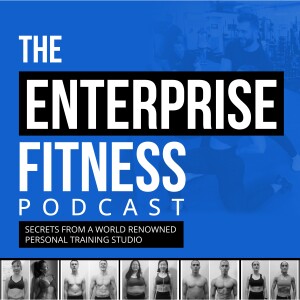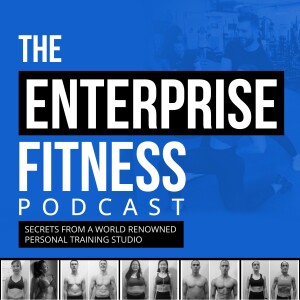
Andrew Lock Questions
Intro
Welcome to The Wolfs Den. My names Mark Ottobre and my job is to breakdown the world of health, fitness and performance. My guest today is Andrew Lock.
Andrew is one of the worlds most sought after rehab professionals for athletes. His been on a lifelong quest pursuing excellence in rehabilitation.
If I read out just a few of his achievements, Andrew is
Accredited in the McKenzie Spinal Method
Completed his Masters degree in 2004, studying the resolution of intervertebral disc injuries.
His a Convenor of Australian Strength Scientists Association (ASSA).
The Coordinator “Ultimate Strength Summit” at the Arnold Sports Festival Australia 2019
A IFBB Pro League Judge
A Current Bench Press Australian AND World Record Holder
And the owner Functional Strength Rehabilitation which has clients all over the world. Andrew had advised and consulted with a diverse range of athletes including members of the Australian Cricket Team, Major League Baseball, Bodybuilders, football, MMA, and athletes in all Strength Sports.
I’ve know him over over 10 years, and love having him in teach and educate both the team here at Enterprise and the students at Wolfpack, so its my pleasure to welcome Dr. Andrew Lock!
-
Its great to have you on, were probably going to jump around today with a few different topics, but were I would love to start is; How much do you bench?
-
Now thats out the way, tell me your journey into physiotherapy?
How did you get to become a physio?
Why?
2. Would you describe yourself as a regular physio?
Why/why not?
What do you do differently?
What do others overlook?
3. What do you think is the biggest myth in physiotherapy?
3 a). What’s the prevailing lie you feel that gets repeated in traditional physio education?
(Note: if not discussed, prompt; Is it 80% of injury reoccur after the first 4 weeks? and 80% are resolved if they do nothing?)
4. Let's talk Pilates; who was Joseph Pilates and what happened in the Federal court of America?
5. Switching gears to something similar to this, the Kettle swing. It has been deemed as ‘bad” by some strength coaches. What are they missing?
6. So what is the worst thing you can do for a back?
6. a) and on back pain, one of the most common intervention is the humble backbend?
-do Demo
6. b) is it true, the way we should think about lower back pain is usually its the problem of the abs not working the way they should?
Audience ask; does anyone here have lower back pain?
Let get them up…
So question for you;
using the humble bodyweight squat as an assessment, we can see that this guy tucks his hips under, which would indicate his abs are too weak. if we give him something to counterbalance, the issue goes away.
Is it as simple as that, or what are we missing here?
What else should we be looking for?
7. Deadlifts.
It’s almost paradoxical. On one side of the fence you have people shouting deadlifts are bad, on the other, the most absurd and ridiculous technique that's touted as “as long as the bar is close to the shins its some how ok.
Now you’ve studied world champion deadlifters, what’s the commonality you found?
(Note: if not addressed, ask about fishing hook spine and vertical tibias)
8. You’ve rehabbed shoulders using the bench press?
That’s counter intuitive - how does that work?
8. a) What’s your current best bench?
What have you done differently to achieve that level?
-Side questions if needed - incline, rotators etc
9. What’s the worse injury you’ve seen and the recovery?
view more
More Episodes
The Truth About Supplements - Mark Ottobre
 2024-02-28
2024-02-28
 396
396
 2024-02-28
2024-02-28
 396
396
Transforming Your Physique on a Guaranteed Timeline - Tyrone
 2024-02-14
2024-02-14
 234
234
 2024-02-14
2024-02-14
 234
234
The Hardest Client I'll Ever Have to Train
 2024-01-15
2024-01-15
 209
209
 2024-01-15
2024-01-15
 209
209
How to Strength Train for Sports and Performance
 2024-01-10
2024-01-10
 226
226
 2024-01-10
2024-01-10
 226
226
S6:E32 - How we set goals for 2024 (EF Year in Review!)
 2023-12-13
2023-12-13
 127
127
 2023-12-13
2023-12-13
 127
127
S6:E31 - Do Christmas Calories Count?
 2023-12-08
2023-12-08
 154
154
 2023-12-08
2023-12-08
 154
154
S6:E30 - Exploring Philosophy, Amor Fati, and More
 2023-11-29
2023-11-29
 186
186
 2023-11-29
2023-11-29
 186
186
S6:E28 - Three Diet Strategies: Which One Fits You?
 2023-11-15
2023-11-15
 286
286
 2023-11-15
2023-11-15
 286
286
S6:E27 - Principles to Coaching Change!
 2023-11-08
2023-11-08
 176
176
 2023-11-08
2023-11-08
 176
176
S6:E26 - Hormones and Calories
 2023-11-01
2023-11-01
 236
236
 2023-11-01
2023-11-01
 236
236
S6:E24 - You Don’t Need a Better Diet...
 2023-10-18
2023-10-18
 191
191
 2023-10-18
2023-10-18
 191
191
S6:E23 - BTS: The Real Journey of an Olympic Athlete?!
 2023-10-04
2023-10-04
 179
179
 2023-10-04
2023-10-04
 179
179
012345678910111213141516171819
Create your
podcast in
minutes
- Full-featured podcast site
- Unlimited storage and bandwidth
- Comprehensive podcast stats
- Distribute to Apple Podcasts, Spotify, and more
- Make money with your podcast
It is Free
- Privacy Policy
- Cookie Policy
- Terms of Use
- Consent Preferences
- Copyright © 2015-2024 Podbean.com






